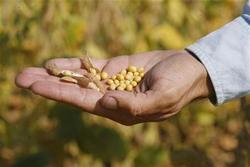Reuters | Thursday May 12, 2011
• Government wants to put limits on foreign ownership
• Drive reflects similar steps in Brazil
• Argentina is major global exporter of grains, beef
By Nicolas Misculin
BUENOS AIRES, May 10 (Reuters) - Argentina's drive to limit land purchases by foreigners is deepening concerns about its investment climate, but is not expected to cause major changes to who owns some of the world's most productive farmland.
President Cristina Fernandez wants to cap individual foreign purchases at 1,000 hectares (2,471 acres) although the proposal, unveiled six months before a presidential election, appears to be more about winning votes than curbing foreign investment.
Argentina, a leading supplier of soy, corn and wheat, joins governments in neighboring Brazil and Uruguay in moving to protect their fertile lands as global food prices soar, turning agricultural land into a prized commodity.
Many Argentine farmers, at odds with the government for years over interventionist policies such as export limits, have welcomed Fernandez's land purchase bill and the measure is expected to easily pass Congress this year.
But industry analysts say it could be another red flag to international investors just as traditional pre-election jitters slow capital inflows to Latin America's No. 3 economy.
"Foreign investment in 2011 is already being very cautious simply because there's an election coming," said Jimena Blanco, an analyst at Latin American Newsletters, based in Britain.
"This proposal is really more of a political move than an actual affront on foreign capital or foreign ownership of land," she said, adding that many of the foreign agricultural producers operating in Argentina lease rather than buy land.
While the exact impact of the land bill remains unclear, real estate brokers are concerned, with some urging clients to close deals before it makes it onto the statutes.
In neighboring Brazil, at least $15 billion of foreign investment in land has been halted since the reinterpretation of local real estate laws last year, according to two local agricultural analyst groups.
The Brazilian reform limits foreign purchases to between 250 hectares and 5,000 hectares, depending on the region.
Uruguay has been a magnet for foreign land buyers in recent years, prompting President Jose Mujica to ask lawmakers last year to consider steps to halt the sale of land to foreigners.
As part of Argentina's proposal, a census will be undertaken to see exactly who owns what.
Fernandez said her government aims to limit foreign holdings to 20 percent of total rural lands, but it is not clear how much foreigners currently own or how much they are buying at the moment.
Claudio Mejia, a partner at Compania Argentina de Tierras -- a Buenos Aires-based land brokerage -- said foreigners seeking land have never accounted for more than 12 percent of his clients.
"People are waiting to see what will happen, but we haven't had any case of anyone who was about to buy backing out because of this," he said.
LAND PRICES RISE
Several foreign investors have large land holdings in Argentina, particularly in the southern Patagonia region, but these tracts are generally not used for mass food production.
Argentina is the world's third-biggest soybean producer and No. 2 corn exporter.
Soy products account for more than a quarter of total exports and heavy export taxes mean the oilseed is an important source of state revenue.
Aside from being a top global grains supplier, Argentina is renowned for its succulent beef. High grains prices in recent years have pushed ranching into more marginal areas as farmers turn over lands suitable for agriculture to soybeans.
In some areas, land prices have risen sharply since the country's 2001/02 economic crisis to about $15,000 per hectare, according to Mejia's brokerage.
The price of the most fertile Pampas lands has soared, leading to greater land concentration by larger agricultural companies as well as the growth of so-called "sowing pools," investment funds that rent fields and hire farm managers to cultivate crops on their behalf.
Stefano Pallozzi, a Miami-based farmland broker who does business in Argentina, said the proposed 1,000-hectare limit would hurt investment simply because foreign buyers generally look for more profitable, larger tracts of land.
"In the row-crop business, extensive cultivation systems or even a cow-calf operation, a surface of 1,000 hectares is no longer attractive to anyone -- even less to someone diverting resources from overseas," he said.
Pallozzi said he is hurrying his clients to close pending deals before the bill becomes law.
Agriculture Minister Julian Dominguez has said the reform would be good news for overseas agricultural investors by assuring them "a clear legal framework."
But some industry players are skeptical, fearing the bill could be used as a tool to further control agriculture.
"It's clear that it would discourage investment," said Fernando Botta, an analyst with agricultural consultancy and grains trading firm AgroBrokers in Rosario.
"When these types of laws are generated ... there is the possibility that the state will have an excuse to increase its interventions," he said. (Writing and additional reporting by Hugh Bronstein; Editing by Helen Popper and Kieran Murray)
ANALYSIS-Argentine land sale limits no threat to output
- Tags: Argentina
-
 Reuters
Reuters
- 11 May 2011
Who's involved?
Whos Involved?
Carbon land deals
Dataset on land deals for carbon plantations
07 Oct 2025 - Cape Town
Land, life and society: International conference on the road to ICARRD+20
Languages
- Amharic
- Bahasa Indonesia
- Català
- Dansk
- Deutsch
- English
- Español
- français
- Italiano
- Kurdish
- Malagasy
- Nederlands
- Português
- Suomi
- Svenska
- Türkçe
- العربي
- 日本語
Special content
Archives
Latest posts
-

CAR offers land ownership using cryptocurrency
- IT Web
- 23 June 2025












